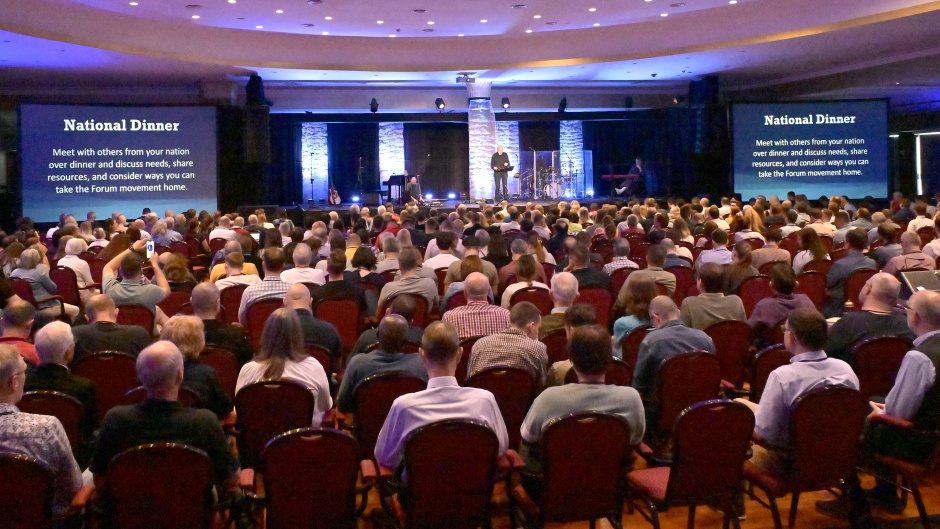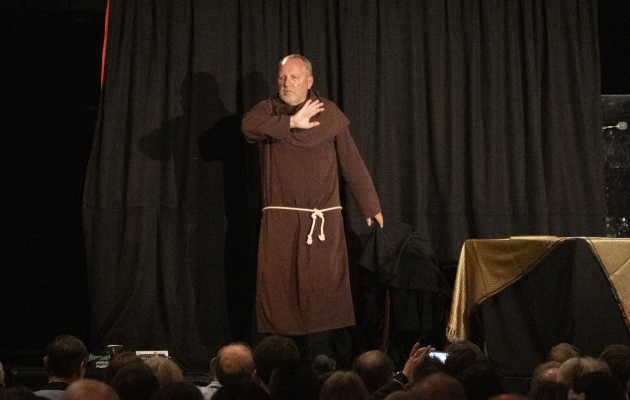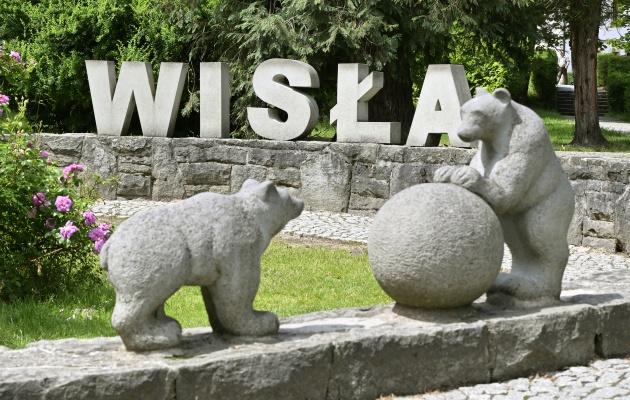Wisla in Poland was a hustle and bustle of conversations fostered by the extensive programme of the European Leadership Forum conference. These were the highlights from our point of view.
 Around 800 Christian leaders from 51 countries attended the ELF conference, in Wisla, Poland, 25-30 May 2024. / Photo: Dennis Craft.
Around 800 Christian leaders from 51 countries attended the ELF conference, in Wisla, Poland, 25-30 May 2024. / Photo: Dennis Craft.
The best-attended European Leadership conference was an inspiring gathering of Christian leaders eager for missionary connections and evangelical perspectives on the future of the continent.
Evangelical Focus was represented at an annual conference that addresses a wide range of issues shaping the realities of church and culture in Europe. More than 800 participants from 51 countries travelled to Poland for the weeklong programme.
These are 8 ideas we took home.
“This is probably the best conference atmosphere I have ever experienced”, said one participant who has attended many such gatherings in several continents. Conversations were lively during the coffee breaks, at the buffet queue, as plenary sessions ended, waiting for seminars to begin...
The growing presence young participants (the organisation's strategy of inviting the under-35s is evident) adds even more to this vital and engaging mood.
“Oh, you’re from Norway? Do you know so and so?” “I had heard some things about the growth of churches in Albania, how nice to meet a pastor from there!” “How do you see the Christians in Ukraine in these two years?”
Many arrive to Wisla at the end of May tired of working in often very demanding local environments, in need of personal renewal. So, any conversation with another participant is a chance to learn and be encouraged by a brother or sister who is part of the same mission. ‘We are in this together’, as a representative from Italy often repeats.
.jpg)
[photo_footer] Conversations everywhere during the coffee breaks. / Photo: Dennis Craft.[/photo_footer]
“The book of Revelation paints the Gospel in bright colours for turbulent times”, said René Breuel, Bible expositor of this year in one of his very engaging and encouraging sermons on the final book of the Bible.
There is a throne
The throne is not empty
He who is in the throne is worthy
He has a plan
He is a Lion who wins like a sacrificed Lamb
No one can compete with him.
"By your blood you ransomed people for God from every language and nation"
Revelation 4-5. @ReneBreuel #2024elf
— Joel Forster (@joelfwal) May 28, 2024
The apocalyptic vision that “There is a throne, and it is not empty” contrasted sharply with the crises in the European continent, which were addressed by experts in the afternoons. The war reality on the ground in Ukraine, the advance of secular ideologies in media and politics, the impact of broken social media on young and old, leadership failure among pastors (including abuse and divorce), the plummeting of Bible engagement among many Protestants.
ELF has been key in bringing together for 22 years in a row now (also during Covid) Christian thinkers who know how to give a Christian approach to the present and future trends. Most valuable is the ability of so many (from academics to practitioners in hostile contexts) to offer a hopeful approach, a bright picture of the future for an often depressing present.
.jpg)
[photo_footer] A view of the Open Art studio at this year's gathering. / Photo: Dennis Craft.[/photo_footer]
Charles Kelley, who finished a decade-long coordination of the Arts Network, received a long round of applause at one of the plenary sessions. His vision is to bring together creative people who are able to build bridges to unexplored faith conversations. Among them were the pianist Reinis Zaris (Latvia) or the singer Angela Mackenzie (Scotland).
Every year, the patio caffe of the conference hotel turns into an open art studio, where everyone wanting to try something new can come along.
Artists have always shaped the collective imaginary of societies with their often neglected by deep influence. An example of the intersections is the excellent Norwegian-Tanzanian animation project ‘The Legacy of Adam’ presented in this year’s Media Communicators network. Or Steiger’s shows in avant-garde outreach events.
Will Artificial Intelligence kill creative art? Surely not if artists (and especially Christians) continue to use the tools available to connect with realities of the human soul that technology can hardly describe. The Generation Z knows this well.
It’s only five minutes in sessions of 90, but how enriching they are. At each plenary, someone different shares prayer requests from the podium, and the whole conference multiplies into mini-groups of 3-4 people to pray - almost always with people you have not met yet and who just happen to be sitting next to you.
Addressing the same God in the same spirit, hard-to-explain connections happen between people who otherwise would never have started a conversation. There is no better way to get to know a Christian who a few moments ago was a perfect stranger than to pray together. And it may even fuel connections for mission.
No doubt about this: the organisation of ELF should continue to give prayer such a strategic place.
.jpg)
[photo_footer] Small groups praying at a 2024 ELF morning plenary. / Photo: Dennis Craft.[/photo_footer] With its system of scholarships to cover almost the entire registration costs of participants from certain European regions, the ELF conference achieves something essential: ensuring the presence of evangelical leaders from post-communist environments such as Romania, hyper-catholic societies such as Poland, historically polarised societies such as Serbia or very secularised cultures such as the Czech Republic.
As Kevin Saylor explained, half of the attendees at the Wisla conference year came from Eastern and Central Europe. Key to hearing their voice (and that of participants from Mediterranean countries such as Spain, Greece, Portugal and Italy) is the financial support raised in its thousands of euros over the year. Many passed through the ‘thank you letters’ room in the hotel to give something back to the generous donors in the US and elsewhere.
The mission initiatives of Eastern Europeans in volatile contexts (with very relevant ministries among young people, for example), and the relevance of their social action (schools, refugee centres, reintegration businesses, outreach to Roma people, theological training) must be seen and valued by Christian leaders in Western Europe who often complain about not witnessing enough spiritual fruit.
If there is one thing Christians in the rest of the world complain about Europe, it is that Protestants here (and that includes free evangelicals) have not enough confidence in the Bible and the power of the gospel. The liberal drift of many national Protestant churches is seen with surprise elsewhere. That is why it is so encouraging to have confident Bible readings and good expository preaching in European gatherings like ELF.
Was this a working conference? Yes, it was. Is networking and training a priority for those who attend? Of course. But at the heart of the gathering is also to engage with the soul of those who travel to Poland. A precious example of this was a plenary session on the spiritual journey of Martin Luther, in which the German translator and theologian Roland Werner played the monk in a dramatised history lesson that ended with the 800 participants singing ‘A Mighty Fortress Is Our God’ - a capella.
Also moving were the times of worship, in which the band selected some of the best lyrics in modern worship. Many of us used the chance to write down titles of songs which might work well (if translated) back in our home churches.

[photo_footer] Roland Werner in the role of Martin Luther, in one of the evening plenaries of ELF 2024. / Photo: Dennis Craft.[/photo_footer] We certanly need spaces to talk about Europe! Much is happening here, and Christian leaders are eager to understand all the trends happening in our diverse continent. But how good it is also to listen to an African preacher, or an Egyptian Bible expert. This year, the delegation of ‘hand-picked global leaders’, as the ELF organisation describes it, included representatives from the South Korean church. Their message was one of collaboration, of mutual learning, of reaching out to churches in Europe. As the world polarises, the church has the opportunity to go against the tide by weaving trust among those who share a global vision of God's mission.
One of the fine lines that journalists like us at Evangelical Focus over the years is to analyse the ‘issues of the city’ (politiké) without favouring certain political trends over others. We try to use gospel perspectives that approach all ideologies with a critical mindset.
This is something the ELF does, as well as other pan-European movements such as the Lausanne Movement Europe or the European Evangelical Alliance.
During ELF 2024, there was hardly ever an approach of one of its over 50 speakers that indicated implicit support for certain policies. Our evangelical Europe in this sense remains an oasis of social-political plurality that contrasts with the thinly disguised support that (public) evangelicals often show in other parts of the globe (especially on the other side of the Atlantic).
This said, a mention of the impending European Parliament elections would have been interesting at some point of the conference, if only to pray for the complex scenario that the EU and other neighbouring countries will face in the next 5 years!

[photo_footer] A park in the centre of Wisla, south of Poland. / Photo: Dennis Craft.[/photo_footer] The idyllic village of Wisla (home of winter skiing competitions) is far from everything, in the middle of a valley with a river of the same name. The small forests region bordering the Czech Republic is known for being a Protestant exception in a ‘90% Catholic’ Poland.
To get there you need between 2 and 3 hours by road from the two nearest Polish airports: Krakow or Katowice. Conference shuttles leave make the connection. And it is sitting in these minibuses, whether on the first day of arrival or on the last day on the way to catch the plane, that deep conversations can take place.
One example: I spent two hours receiving a personalised masterclass on how the alternative blockchain economy works. As a journalist, it can be overwhelming to report on global movements like the Bitcoin movement without ever having had the chance to grill an expert for more than 15 minutes. So, there he was, sitting next to me, Joel Swanson, who had led a workshop during the conference. I had not been able to attend it, so I used the chance to ask all my questions on this very specific niche topic. Thank God for his providence, even on boring travel days.
Joel Forster, journalist and director of Evangelical Focus.
Would you be interested in attending ELF in the future? Visit their website. Hundreds of video sessions are available on FOCL Online.
[analysis]
[title]One more year[/title]
[photo][/photo]
[text]At Evangelical Focus, we have a sustainability challenge ahead. We invite you to join those across Europe and beyond who are committed with our mission. Together, we will ensure the continuity of Evangelical Focus and Protestante Digital (Spanish) in 2024.
Learn all about our #OneMoreYearEF campaign here (English).
[/text][/analysis]

Las opiniones vertidas por nuestros colaboradores se realizan a nivel personal, pudiendo coincidir o no con la postura de la dirección de Protestante Digital.
Si quieres comentar o